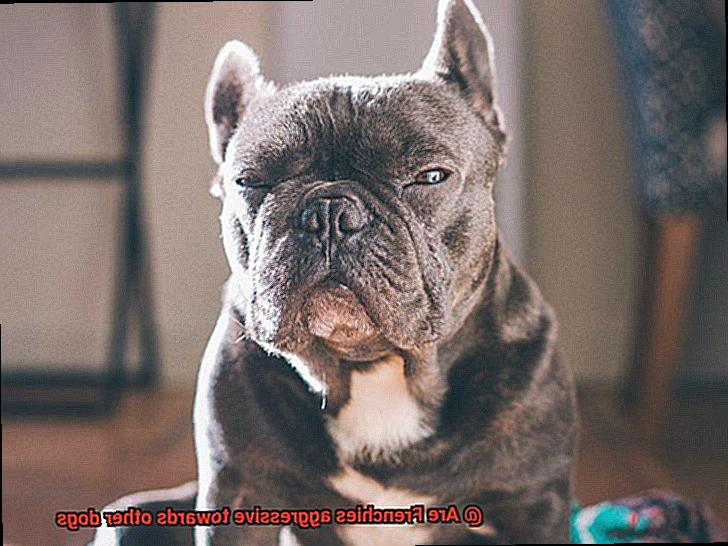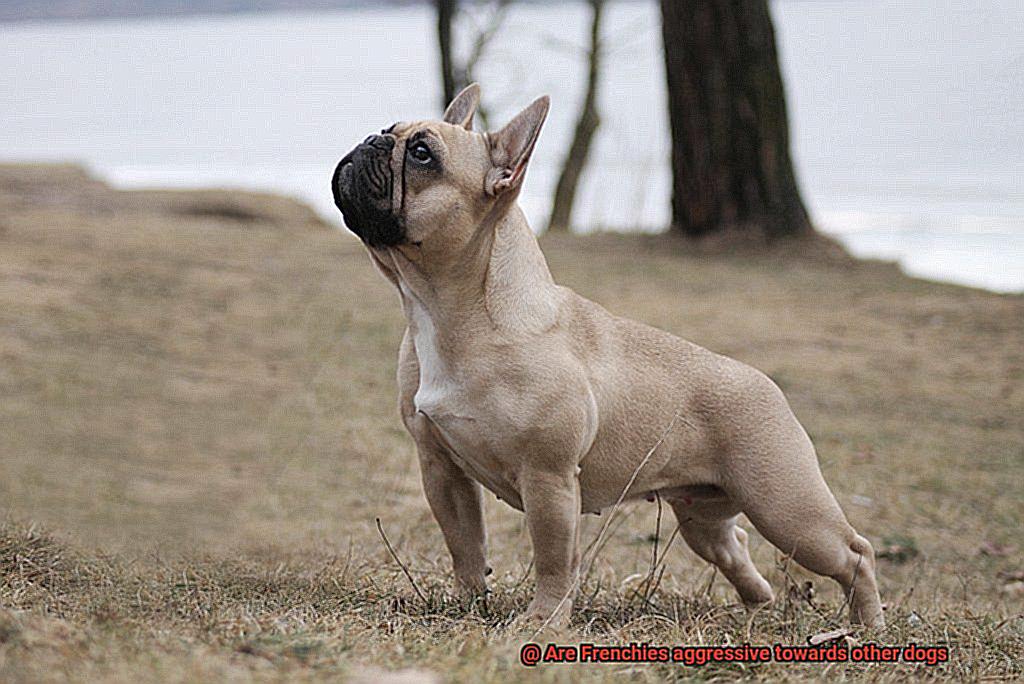Are Frenchies aggressive towards other dogs?
Picture this: those squished faces and mischievous personalities of French Bulldogs have won over countless hearts, making them cherished companions. But amidst the adoration, a heated debate rages on about their temperament, especially when it comes to mingling with fellow canines. Hence, today we embark on a quest to uncover the answer to one burning question: Are French Bulldogs aggressive towards other dogs?
Within these lines, we’ll take an unbiased voyage, relying on scientific research and expert insights to illuminate this frequently debated aspect of their behavior. By presenting a well-rounded perspective, our aim is to equip you with a comprehensive understanding of how French Bulldogs truly behave when they encounter their furry counterparts.
So buckle up and brace yourself as we dive headfirst into the truth behind French Bulldogs’ interactions with other dogs. Whether you’re already an owner smitten by these four-legged charmers or simply a dog enthusiast seeking knowledge, this article will empower you to make informed decisions and unravel the potential dynamics at play.
The History of Frenchies and Their Breeding Purpose
Contents
- 1 The History of Frenchies and Their Breeding Purpose
- 2 Examining the Reasons Why Frenchies are Generally Not Aggressive
- 3 Understanding the Factors That May Influence a Frenchie’s Behavior Towards Other Dogs
- 4 The Importance of Socialization in Ensuring Positive Interactions With Other Dogs
- 5 Training Tips To Help Prevent Potential Aggression Issues From Developing
- 6 How To Handle Unwanted Aggressive Behaviors From Your Frenchie
- 7 The Role of Diet and Exercise In Keeping Your Frenchie Calm and Balanced
- 8 Conclusion
In this article, we will delve into the rich history of French Bulldogs and explore their breeding purpose as beloved companions.
Origins in England:
French Bulldogs originated in England during the 1800s. They were bred to be miniature versions of the English Bulldog, which was a popular breed used in bull-baiting. However, as bull-baiting was outlawed in England, breeders began focusing on creating a smaller version of the Bulldog for companionship.
Migration to France:
During the industrial revolution, lace workers from Nottingham, England migrated to France, bringing their beloved Bulldogs with them. This migration played a crucial role in introducing Frenchies to France and establishing their popularity in the country.
Refinement in France:
In France, French Bulldogs underwent further refinement and development to create a distinct breed. Selective breeding was carried out to enhance their unique features such as bat-like ears, compact size, and adorable facial wrinkles that we all love.
Purpose as Companions:
Frenchies quickly became fashionable companions for the upper class in France. Artists, writers, and society figures were drawn to their charming personalities and distinctive looks. The breeding purpose shifted from working dogs to treasured pets who provided companionship and brought joy to their owners’ lives.
Traits from Bulldog Ancestors:
Although Frenchies were bred primarily for companionship, they still retain some traits from their Bulldog ancestors. While they are not aggressive by nature, they may display protective instincts towards their owners or territory if provoked. However, responsible breeding practices focus on producing puppies with stable temperaments and ensure that both parents have good temperaments as well.
Examining the Reasons Why Frenchies are Generally Not Aggressive
French Bulldogs, also known as Frenchies, are beloved for their friendly and sociable nature. They have gained a reputation for being great family pets due to their gentle and non-aggressive demeanor. In this blog post, we will explore the reasons behind why French Bulldogs are generally not aggressive towards other dogs.
Breeding History:
French Bulldogs were originally bred as companion dogs rather than for aggressive purposes. They were developed in the 1800s by crossing English Bulldogs with smaller breeds like terriers and pugs. The goal was to create a smaller Bulldog that would be better suited as a lap dog and companion. This intentional breeding process focused on selecting dogs with friendly and docile personalities, resulting in Frenchies that are generally easygoing and amiable towards other dogs.
Sociable Temperament:
French Bulldogs exhibit a naturally sociable temperament. They are known for being good with children and are patient and tolerant, making them excellent family pets. Their sociability extends to other dogs as well, as they tend to be friendly towards their canine counterparts. This friendly disposition stems from their inherent desire to please their owners and bond with humans. Frenchies thrive on social interaction and enjoy the company of both humans and animals.
Calm Demeanor:
French Bulldogs have a laid-back and relaxed temperament, which contributes to their non-aggressive nature. Unlike some other breeds that may be hyperactive or overly excitable, Frenchies are generally calm and composed. Their calm demeanor helps prevent situations from escalating into aggression, making them more likely to peacefully interact with other dogs.
Proper Socialization:

Proper socialization plays a crucial role in shaping a Frenchie’s behavior towards other dogs. Early exposure to different environments, people, and animals helps them develop a positive outlook and confidence when encountering new situations. When properly socialized, French Bulldogs learn how to interact appropriately with other dogs and are less likely to display aggression.
Individual Variations:
While French Bulldogs are generally not aggressive towards other dogs, it is important to recognize that there can always be exceptions. Just like humans, dogs have their own unique personalities and experiences that influence their behavior. Some Frenchies may exhibit aggression due to factors such as improper training, fear, or past traumatic experiences. It is essential for owners to be aware of their Frenchie’s behavior and address any signs of aggression through proper training and guidance.

Understanding the Factors That May Influence a Frenchie’s Behavior Towards Other Dogs
French Bulldogs, or Frenchies, are known for their friendly and sociable nature. They are often described as affectionate, playful, and good-natured. However, like any dog, a Frenchie’s behavior towards other dogs can be influenced by various factors. Let’s take a closer look at these factors and how they can impact a Frenchie’s behavior.
Genetics:
Genetics play a significant role in shaping a dog’s behavior. While aggression towards other dogs is not a breed-specific trait in Frenchies, certain genetic factors may influence their predisposition towards aggression or friendliness. It is crucial to choose a Frenchie from a reputable breeder who prioritizes temperament and behavior in their breeding program.
Socialization:
Proper socialization is key to ensuring that a Frenchie develops positive behaviors towards other dogs. Early and ongoing socialization involves exposing them to different environments, people, and other dogs from a young age. This helps them develop confidence, learn appropriate social skills, and form positive associations with new experiences.
Training:
Training is essential for shaping a Frenchie’s behavior towards other dogs. Consistent and positive reinforcement-based training methods help establish boundaries, reinforce good behavior, and teach appropriate ways to interact with other dogs. Training should focus on teaching the Frenchie to remain calm and composed in the presence of other dogs, rather than reacting aggressively.
Individual Temperament:
Just like humans, each Frenchie has its own unique personality traits. Some Frenchies may naturally be more outgoing and friendly towards other dogs, while others may be more reserved or even territorial. Understanding your Frenchie’s individual temperament can help you tailor your approach when introducing them to new dogs and managing their interactions.
Fear and Anxiety:
Fear and anxiety can also influence a Frenchie’s behavior towards other dogs. If a Frenchie has had negative experiences or lacks confidence, they may exhibit fear-based behaviors such as aggression or avoidance towards other dogs. It is important to create a safe and positive environment for your Frenchie, address any fears or anxieties they may have, and seek professional help if needed.
Remember, aggression towards other dogs is not desirable or typical behavior in Frenchies. If you notice any signs of aggression in your Frenchie, it is important to seek professional help from a qualified dog trainer or behaviorist. They can assess the underlying causes of the aggression and provide you with effective strategies to address the issue.
The Importance of Socialization in Ensuring Positive Interactions With Other Dogs
French Bulldogs, like any other breed, can exhibit varying levels of aggression towards other dogs. However, it is important to note that aggression is not a breed-specific trait and can be influenced by various factors such as genetics, early socialization, training, and individual temperament.
Socialization plays a crucial role in ensuring positive interactions between Frenchies and other dogs. It involves exposing them to various social situations, environments, and different types of dogs from a young age. This helps them develop appropriate social skills and learn how to communicate effectively with their canine counterparts.
Early socialization is particularly important for French Bulldogs as they tend to have a naturally assertive and sometimes stubborn personality. By exposing them to positive experiences with other dogs during their critical developmental period (between 3 and 16 weeks of age), they are more likely to grow up to be well-adjusted and friendly towards their fellow canines.
Proper socialization helps French Bulldogs understand appropriate dog-to-dog communication signals, body language, and play behaviors. It allows them to learn how to interpret and respond appropriately to the cues given by other dogs, reducing the likelihood of misunderstandings or conflicts.
So how do we go about socializing our French Bulldogs? It should be a gradual process that starts with controlled introductions to calm and friendly dogs in a safe and supervised environment. Slowly increasing the level of difficulty by introducing different sizes, breeds, and energy levels of dogs can help Frenchies become more adaptable and comfortable in various social settings.
Positive reinforcement training techniques should be utilized during socialization sessions to reward desired behaviors such as calmness, appropriate play, and good manners when interacting with other dogs. This helps French Bulldogs associate positive experiences with other dogs, reinforcing their confidence and promoting positive interactions.
It is important for French Bulldog owners to continue socializing their dogs throughout their lives, even beyond the critical developmental period. Regular exposure to different dogs and environments helps maintain their social skills and prevents regression or fear-based aggression that may develop due to lack of socialization.
In addition to socializing with other dogs, it is also beneficial for French Bulldogs to have positive experiences with a variety of people, animals, and environments. This helps them become well-rounded and adaptable companions who are comfortable in various social situations.
Overall, the importance of socialization in ensuring positive interactions with other dogs cannot be overstated for French Bulldogs. It not only helps prevent aggression but also promotes mental and emotional well-being, enhances their overall quality of life, and strengthens the bond between dogs and their owners.
Training Tips To Help Prevent Potential Aggression Issues From Developing
French Bulldogs are generally friendly and sociable, but like any breed, they can display aggression if not properly trained and socialized. Training is essential in preventing aggression issues from developing in Frenchies. In this article, we will explore some training tips to help keep your Frenchie happy and well-behaved around other dogs.
Early Socialization:
Early socialization plays a crucial role in preventing aggression in French Bulldogs. Exposing them to different people, animals, and environments from a young age helps them develop positive associations and reduces fear-based aggression later in life.
Take your Frenchie to supervised playdates with well-behaved dogs, visit dog-friendly parks, and enroll them in positive reinforcement training classes to encourage socialization.
Positive Reinforcement Training:
Positive reinforcement training methods, such as using rewards like treats and praise, are highly effective in shaping desired behavior and preventing aggression. Teach basic obedience commands like sit, stay, and come using positive reinforcement techniques. Consistency and patience are key to successful training.
Leash Training:
Proper leash training is important in preventing leash-reactivity and aggression towards other dogs while on walks. Teach your Frenchie to walk calmly on a leash and ignore or greet other dogs politely. Use positive reinforcement, gradually introduce distractions, and redirect attention away from other dogs.
Controlled Introductions:
Introducing French Bulldogs to new dogs should be done in a controlled and supervised manner. Start with neutral territory and use positive reinforcement techniques to reward calm behavior. Gradually decrease the distance between the dogs while ensuring their safety.
Managing Triggers:
Identifying and managing potential triggers for aggression is crucial. Understand what situations or stimuli may cause your Frenchie to become aggressive, such as resource guarding or fear of certain types of dogs. Implement a consistent routine, create safe spaces, and provide appropriate outlets for energy to minimize triggers.
Seeking Professional Help:
If you’re experiencing difficulties in training or managing your Frenchie’s aggression, don’t hesitate to seek professional help from a qualified dog trainer or behaviorist. They can provide guidance tailored to your Frenchie’s specific needs and ensure everyone’s safety.
How To Handle Unwanted Aggressive Behaviors From Your Frenchie
French Bulldogs, or Frenchies, are known for their friendly and sociable nature. However, there may be instances where they display unwanted aggressive behaviors towards other dogs. In this article, we will provide tips and strategies on how to handle these behaviors in a safe and effective manner.
Recognizing Signs of Aggression:
To effectively handle your Frenchie’s aggression, it is crucial to be able to recognize the signs. These can include growling, snarling, lunging, snapping, or biting. Pay attention to your Frenchie’s body language, such as raised hackles, stiff posture, or intense staring. By identifying these signs early on, you can take appropriate action to prevent any potential confrontations.
Understanding the Underlying Causes:
Aggression in Frenchies can stem from various factors, including fear, resource guarding, territoriality, or a lack of socialization. It is essential to understand the underlying cause of your Frenchie’s aggression to address it appropriately. Consult with a professional dog behaviorist or trainer who can help assess your Frenchie’s behavior and provide guidance tailored to their specific needs.
Providing Proper Socialization:

Socializing your Frenchie from an early age is crucial in preventing aggressive behaviors towards other dogs. Expose them to different environments, people, and other dogs in controlled settings to help them become comfortable and confident in various situations. Gradually introduce them to new experiences and reward positive interactions with treats and praise. This process will help shape their behavior and reduce the likelihood of aggression towards other dogs.
Implementing Positive Reinforcement Training:
Positive reinforcement training techniques are highly effective in modifying aggressive behaviors in Frenchies. Instead of punishing or scolding your Frenchie for their aggression, focus on rewarding their desired behaviors. Use treats, toys, or verbal praise to reinforce calm and non-aggressive responses when encountering other dogs. Consistency and patience are key in training your Frenchie to replace unwanted aggressive behaviors with more appropriate ones.
Managing Their Environment:
Managing your Frenchie’s environment is crucial in preventing situations that may trigger their aggressive behaviors. Keep them on a leash when in public, especially around other dogs, to maintain control and prevent any potential confrontations. Create a safe space at home where your Frenchie can retreat to if they feel overwhelmed or anxious. Additionally, avoid exposing them to situations that may provoke aggression, such as crowded dog parks or high-stress environments.
Seeking Professional Help if Needed:
If your Frenchie’s aggressive behaviors persist despite your best efforts, it is essential to seek professional help. A qualified dog behaviorist or trainer can assess the situation, provide personalized guidance, and develop a behavior modification plan tailored to your Frenchie’s needs. They may recommend additional techniques or interventions, such as counter-conditioning or desensitization exercises, to address the aggression effectively.
The Role of Diet and Exercise In Keeping Your Frenchie Calm and Balanced
French Bulldogs, or Frenchies, are beloved companions known for their friendly and sociable nature. However, like any breed, they may occasionally display unwanted behaviors such as aggression towards other dogs.
In this article, we will explore the important role of diet and exercise in keeping your Frenchie calm and balanced, which can significantly reduce the likelihood of aggression.
Diet:
Feeding your Frenchie a balanced and nutritious diet is crucial for their overall well-being. Opt for high-quality dog food specifically formulated for French Bulldogs, ensuring it contains the necessary nutrients to support their physical and mental health. Avoid feeding them table scraps or unhealthy treats, as these can lead to weight gain and potentially affect their behavior.
Exercise:
Frenchies are energetic dogs that require regular exercise to keep them physically and mentally stimulated. Daily exercise not only burns off excess energy but also promotes good behavior and reduces the chances of aggression towards other dogs. Aim for at least 30 minutes of moderate-intensity exercise each day, such as walks, fetch, or running in a secure area. However, be mindful of their brachycephalic structure and their limitations in strenuous activities.
Mental Stimulation:
In addition to physical exercise, mental stimulation is equally important for keeping your Frenchie calm and balanced. These intelligent dogs thrive on mental challenges, so incorporating activities that engage their minds can help prevent boredom and subsequent behavioral issues.
Puzzle toys, interactive games, obedience training sessions, and even scent work can provide mental stimulation and help channel their energy in a positive way.
Routine:
Establishing a consistent routine for your Frenchie can greatly contribute to their overall well-being and behavior. Dogs are creatures of habit and having a predictable schedule helps them feel secure and reduces anxiety or stress that can lead to aggression.
Set regular mealtimes, exercise sessions, playtime, and rest periods throughout the day. This not only provides structure but also allows your Frenchie to anticipate what comes next, reducing any potential triggers for aggressive behavior.
Socialization:
Proper socialization from an early age is crucial in preventing aggression towards other dogs in Frenchies. Exposing them to different environments, people, and other dogs helps them develop positive associations and learn appropriate behaviors. Gradually introduce your Frenchie to new experiences, ensuring they have positive interactions with other dogs and receive rewards for calm and friendly behavior. Enrolling them in puppy classes or engaging the services of a professional dog trainer can be beneficial in teaching them proper social skills.
EvweYG93oF0″ >
Conclusion
In conclusion, when it comes to the question of whether Frenchies are aggressive towards other dogs, the answer is not a simple yes or no. While some French Bulldogs may exhibit aggressive behavior towards other dogs, it is important to remember that aggression can be influenced by various factors such as genetics, socialization, and individual temperament.
It is crucial for Frenchie owners to provide proper training and socialization from an early age to ensure their dog develops good behavior towards other dogs. Additionally, understanding and managing triggers that may provoke aggression in French Bulldogs can help prevent any negative interactions.
While Frenchies are generally known for their friendly and sociable nature, it is always wise to monitor their interactions with other dogs and intervene if necessary. Remember, every dog is unique, and individual experiences may vary.
So, if you’re considering getting a Frenchie or already have one at home, don’t fret too much about their potential aggression towards other dogs. With the right training and care, they can become well-behaved companions who get along just fine with their furry counterparts.
In summary, while some French Bulldogs may display aggressive tendencies towards other dogs, it is not a characteristic inherent to the breed as a whole. By providing proper training and socialization, Frenchie owners can help ensure their dog’s interactions with other dogs are positive and harmonious.




